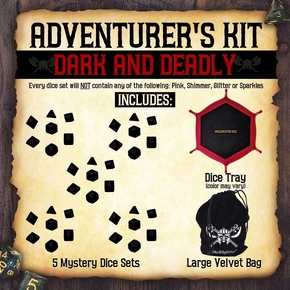
Polymorph 5e Guide
She Turned Me into a Newt! I Got Better...
Polymorph is the source of some of the funniest D&D stories and is an outlet for a player's creative problem-solving harkening all the way back to the earliest days of the game. The spell polymorph turns a creature (temporarily) into any animal you can think of. Turn the big bad evil guy into a chicken or turn your ally into a t-rex and watch them rampage through the enemy ranks. There's an amazing number of problems that can be solved with a sudden transformation and to get your creative polymorphing juices flowing we're going to go through everything you need to know.
Table of Contents:
The Spell Itself
Before we dig into the specifics of my favorite dnd 5e spell, let's take a look at the raw spell description itself:
Polymorph
4th-level transmutation
Casting Time: 1 action
Range: 60 feet
Components: V, S, M (a caterpillar cocoon)
Duration: Concentration, up to 1 hour
This spell transforms a creature that you can see within range into a new form. An unwilling creature must make a Wisdom saving throw to avoid the effect. The spell has no effect on a shapechanger or a creature with 0 hit points.
The transformation lasts for the duration, or until the target drops to 0 hit points or dies. The new form can be any beast whose challenge rating is equal to or less than the target's (or the target's level, if it doesn't have a challenge rating). The target's game statistics, including mental ability scores, are replaced by the statistics of the chosen beast. It retains its alignment and personality.
The target assumes the hit points of its new form. When it reverts to its normal form, the creature returns to the number of hit points it had before it transformed. If it reverts as a result of dropping to 0 hit points, any excess damage carries over to its normal form. As long as the excess damage doesn't reduce the creature's normal form to 0 hit points, it isn't knocked unconscious.
The creature is limited in the actions it can perform by the nature of its new form, and it can't speak, cast spells, or take any other action that requires hands or speech.
The target's gear melds into the new form. The creature can't activate, use, wield, or otherwise benefit from any of its equipment.
Who Can Cast Polymorph?
You can find polymorph listed on quite a few spell lists and you gain that spell knowledge, and you can cast it if you're a bard, druid, sorcerer, wizard, or cleric of the trickery domain.
How Does Polymorph Work?
5e Polymorph mechanics and rule particulars can be wonky so let's go through it carefully. First off, your target is going to make a Wisdom saving throw against your spell save DC, if they pass then nothing happens, if they fail then the spell takes effect, and they go from their natural form to the beast form of your choice. This is commonly known as a "save or suck" spell as it could do absolutely nothing and you pass your turn, or it could completely reshape a combat.
If your target either fails, their save or is a willing target (more on that in a bit) they become a creature of your choice with the beast type and a CR less than the target's CR or class level. There's a lot to unpack there so let's parse that out.
It has to be a creature with the "beast" type, which generally rules out magical stuff and limits you to mostly real animals. You can turn someone into a velociraptor, but a dragon isn't a viable option.
Next the CR limitation is mostly for "voluntary" polymorphs, rather than "offensive" polymorphs, as it's basically just there to stop you from turning your buddy into something way above your paygrade. Thankfully as a 4th level spell, most beasts have a very low CR and by the time you can cast polymorph your allies should be high enough level to be transformed into (most) critters you can think of.
Now, once your target has been transformed into your carefully selected beast, it basically IS that animal until the spell ends. It retains alignment and personality, but all its scores and abilities including mental stats become that of the animal. This means that if you turn a guy into a rabbit, he's as dumb as a rabbit. A nice guy may be a nice rabbit, and a bad guy may be a mean rabbit, but there's only so much rabbit brain to go around.
Next, we get to the whole clause about hit points. Basically, your target will revert to their true form if their beast form takes enough damage to hit 0, which for most beasts doesn't take much. However, if they take excess damage past 0, that extra damage carries over to their original form, which opens up a whole range of nefarious possibilities...
Finally, it's a concentration spell, which means if you get hit hard and fail a concentration check, your fluffy bunny will revert back to the true form it started as. This makes you a vulnerable target while concentrating, and generally you'll want to keep yourself safe as much as possible while concentrating.
Polymorph FAQ
The polymorph spell can cause a LOT of weird situations and some of its poor wording raises quite a few questions. Let's answer some of the stuff that seems to crop up when casting polymorph in dungeons and dragons 5e:
What Abilities Carry Over?
None. Some of the wording is a bit ambiguous but the spell has been confirmed to completely replace your character, racial traits, and all of your abilities with that of the beast. Basically you pass your character sheet to the side and start using the stat block out of the bestiary, it's that simple.
What Happens to my Stuff?
Every weapon you hold and all the stuff on you disappears into you in mostly the same way as a druid's class ability wild shape. All your stuff is just sort of gone while you're polymorphed and is back on you when you return to your normal form.
Can I Keep Concentration?
Yes. Being polymorphed removes all your spellcasting features so you can't cast new spells, but there's nothing stopping you from keeping concentration on a spell you've already cast. You do have the new creature's Constitution score however, so it'll probably be pretty hard to keep concentrating if you take a big hit while transformed.
What About Spells Cast on Me?
Any spell effects you had active on you stay on you when you're polymorphed. If you had say mage armor active and got turned into a squirrel, you're now a squirrel with mage armor. Note that this doesn't apply to ongoing effects that are directly connected to your class features like a barbarian's rage, those get turned off in beast mode.
What if I Get Huge in a Small Space?
The short answer is that when the size difference has weird implications it's ultimately up to the DM. Sadly, there's no official ruling on a lot of these weird situations. What happens if you get swallowed by a monster and turn into a polymorphed creature twice its size? If your campaign has some objectionable content what happens with a pregnant creature? Some situations are downright bizarre but for a good lot of these situations, we can rely on the dungeons and dragons 5th edition squeezing rules:
Squeezing into a Smaller Space
A creature can squeeze through a space that is large enough for a creature one size smaller than it. Thus, a Large creature can squeeze through a passage that's only 5 feet wide. While squeezing through a space, a creature must spend 1 extra foot for every foot it moves there, and it has disadvantage on attack rolls and Dexterity saving throws. Attack rolls against the creature have advantage while it's in the smaller space.
For any situation where squeezing rules don't apply, it really is just up to your DM. Some of the most common solutions include shunting the creature to the nearest unoccupied space, restraining the trapped creature and dealing it bludgeoning damage, or simply fizzling the spell.
What Happens If I Polymorph an Already Polymorphed Creature?
Let's say Wizard 1 turns you into a squirrel, and then on the next turn Wizard 2 tries to turn you into an elephant, what happens? This digs deep into some of the mechanical guts of 5e dealing with overlapping spells and combining effects, but the short answer is that you'll be an elephant. The last polymorph will take precedence, and you'll be an elephant, and if you drop to 0 hit points or Wizard 2 stops concentrating on their spell, you'll then fall back to the previous form polymorph cast by Wizard 1 and turn into a squirrel.
This one is very wonky and there are legitimate arguments that if your 2nd polymorph ends you'd revert to your normal form and skip the previous casting of polymorph, but from the digging I've done I think going through each form is the correct rules interpretation. But be aware there is no official rule.
Polymorph Strategies
Polymorph is a spell that rewards your creativity and has a LOT of potential uses. Let's go through some of the typical ways you can mightily morph to good effect:
Polymorph the Bad Guy
The most straightforward use of polymorph is to simply point it at the big bad guy and turn them into something else, though exactly how and why you do this has a lot of different permutations:
Coup De Grace a Turtle
Basically, you turn the enemy into a turtle or a mouse or something then spend some time to heal, buff yourself as needed, and then you all murder a turtle to the best of your well-prepared abilities. The turtle will revert to the bad guy's normal form once you start smacking it, but a full round from your entire party against a helpless opponent is usually enough to kill any monster you come across.
Drop a Mouse into a Volcano
It doesn't necessarily have to be a mouse, or a volcano, but on basic principle you transform the bad guy into something easy to toss into some lethal hazard hanging around the dungeon. Yes, they'll revert to normal when that mouse HP runs out, but that really doesn't matter if they're now normal and burning in lava or just took 20d6 of falling damage after being yeeted off a cliff.
Bag of Holding Death Trap
If you don't have a convenient lethal hazard hanging around, you can keep one in your pocket. Bags of holding are fairly common and infinitely useful magic items, and when combined with polymorph they can be a solid (if DM infuriating) way of deleting bad guys. You simply polymorph the baddie into something small enough to fit through the bag's opening, then toss them in and close it up. Whatever creature they were will suffocate, hit 0 hit points, and wake up in their normal form in an airless extradimensional space, and subsequently suffocate and die. There’re some arguments back and forth on this, and it will ultimately be up to your DM, but RAW it should work or the guy you put inside may have the ability to cut his way out, in which case it still works but only once. Bags of holding in 5e when ruptured spill all the contents into the astral plane, so in the worst-case scenario you've spent a magic item to essentially doom whoever you threw in there. It only works on creatures that lack planar traveling abilities, so keep that in mind if you try it at very high tiers.
For all of these strategies, it works best when facing a single big opponent. If your big baddie has buddies, they can simply squish him when he's turned into a mouse and suddenly the baddie is back. It's when you see a single big threatening target that you should start considering polymorph as a potential solution.
Imprison the Fluffy Bunny
Every now and again you'll run into a situation where the bad guy needs to be taken in alive. Maybe you need to interrogate them or return them to some guards alive for a reward, but one way or another you need the guy alive rather than a corpse. A successful polymorph puts a creature completely at your mercy and easily trappable in whatever guard's custody or set of manacles you've got at hand. Pop a polymorph, and toss that fluffy rabbit in prison, it's a heck of a lot easier than fighting the baddie all the way down to zero in their true form before bringing them to the guards.
Party Members Polymorph
Just ask your friends if any of them want to be a t-rex during the next fight and you'll probably get some takers. So long as you can keep concentration, you or your ally can transform into a killing machine with essentially a bank of free hit points. There’re a few different strategies for going about this and some sneaky utility:
Shock and Awe
The first and most straightforward way to do this is right as combat is starting you just t-rex one of your friends up and let them go nuts. Since they keep your personality and alignment, most DMs will let them discern friend from foe still, but remember they've got a brain the size of a walnut now, so they likely won't be good for more than carnage. And this strategy is almost always better on an ally than on yourself. You still have to make concentration checks to keep the polymorph up, which will be hard if you're in the middle of combat taking hits.
"Healing"
Because polymorph basically gives you a "buffer" of the creature's hit points, it can act almost like a healing spell in the middle of combat. If your fighter is on the ropes and you've got no healing left, morph that fighter into a rhinoceros. You exchange a fighter with barely any hit points left into a rhinoceros with full hit points ready to charge into the fight. It's a short-term solution but it can be a huge swing in the middle of a tough combat.
Disappearing Act
No officer, I haven't seen anybody like that, it's just me and my pet cat here... If you're in hot water and people are looking for you specifically, becoming an animal is one of the most surefire ways to deflect suspicion.
Scouting*
I mention this idea not because it's a good idea, but because I see people trying it often and it rarely works out. In some very specific circumstances becoming an animal to squeeze into a tight spot, activate a McGuffin, or get past some security, may be useful. The problem is that whole "tiny brain" issue. Becoming a bat to fly stealthily over the barricades sounds like a great plan, until you realize that you now have the reasoning ability of a bat and completely forget about the plan and go chasing moths. If your DM is especially kind, and you pick an animal of high intelligence such as a wolf or dolphin, it can still work, but don't expect to have full faculties like a druid would.
Best Combat Polymorph Forms
The beast creature type gets pretty low when it comes to viable option choice as you advance in level. The earliest level you can cast polymorph at is 7th, and at CR 7 you're already down to a few best options for your beast form and there's only a couple more you gain at CR 8. Beyond pure damage you may also have to consider a special movement type, something with a special ability, if you need to take a form underwater, or a form with a decent fly speed. Briefly here are the best options for fighting polymorph style:
Available at Level 7
Giant Shark - Only a CR 5 but it's your best aquatic combat form until you get to 8th level targets.
Quetzalcoatl - Basically a big ole' pterodactyl, it's a weak combat form but it has the absolute fastest fly speed you can get at 80 feet.
Mammoth - If you have a lot of room to maneuver as a huge size creature, the charge attack ability gives you a ton of damage potential, if you're inside or in any sort of cramped space I'd go with the giant ape instead.
Giant Ape - Climb speed, good HP, and a solid multiattack with a powerful ranged attack option, giant apes are going to be your best all-round combat option until level 8.
Available at Level 8
Tyrannosaurus Rex - It's not just for the cool factor that the t-rex gets used a lot, it's an absolutely impressive combat form with a very high damage potential. This is going to be your go-to option for combat 9 times out of 10.
Sperm Whale - A relatively new and fantastic option, the sperm whale is the top end of your aquatic combat options, and an especially devastating one against ships. It can also swallow your enemy whole.
-----
Enjoy this Guide? You May Also Like:
Need a New Dice Set? Check out our Polyhedral Dice here. They are perfect for every gamer as a gift or just treating yourself!
Thinking about other classes? Check out our giant list of D&D 5e Tools and Tips here.
New to find a D&D Group? Check out our guide on How to Find a D&D Group
Ever wanted to be a centaur? our Centaur 5e Guide has you covered!
Ever want to play a flying space monkey? Check out our Hadozee 5e guide!
Want a character that makes magic items? Check out our Artificer 5e Guide!
Feel like taking a huge chance and drawing from a deck that could ruin the whole campaign? Check out the infamous magic item: Deck of Many Things in 5e
Become Kung Fu Panda with our Monk Druid 5e Multiclass Guide
Thinking of multiclassing with a ranger and don’t know what to multiclass into? Check out our 5e Ranger Multiclass Guide!
Want the ultimate BBEG that the players don’t even know exist? Check out our False Hydra Guide

Disclaimer
Last updated: January 27, 2019
The information contained on www.SkullSplitterDice.com website (the "Service") is for general information purposes only.
www.SkullSplitterDice.com is a participant in the Amazon Services LLC Associates Program, an affiliate advertising program designed to provide a means for sites to earn advertising fees by advertising and linking to Amazon.com. (source: Section 5)
Blueshift Nine, LLC assumes no responsibility for errors or omissions in the contents on the Service.
In no event shall Blueshift Nine, LLC be liable for any special, direct, indirect, consequential, or incidental damages or any damages whatsoever, whether in an action of contract, negligence or other tort, arising out of or in connection with the use of the Service or the contents of the Service. Blueshift Nine, LLC reserves the right to make additions, deletions, or modification to the contents on the Service at any time without prior notice.
Blueshift Nine, LLC does not warrant that the Service is free of viruses or other harmful components.
Affiliate disclaimer
This affiliate disclosure details the affiliate relationships of Blueshift Nine, LLC with other companies and products.
Some of the links are "affiliate links", a link with a special tracking code. This means if you click on an affiliate link and purchase the item, we will receive an affiliate commission.
The price of the item is the same whether it is an affiliate link or not. Regardless, we only recommend products or services we believe will add value to our readers.
By using the affiliate links, you are helping support the Service, and we genuinely appreciate your support.
Affiliate advertising programs that the Service uses are:
- Amazon Services LLC Associates Program
- As an Amazon Associate, I earn from qualifying purchases.
- Blueshift Nine, LLC is a participant in the Amazon Services LLC Associates Program, an affiliate advertising program designed to provide a means for sites to earn advertising fees by advertising and linking to Amazon.com or endless.com, MYHABIT.com, SmallParts.com, or AmazonWireless.com.
- Pages on this Service may include affiliate links to Amazon and its affiliate sites on which the owner of this Service, Blueshift Nine, LLC, will make a referral commission.



